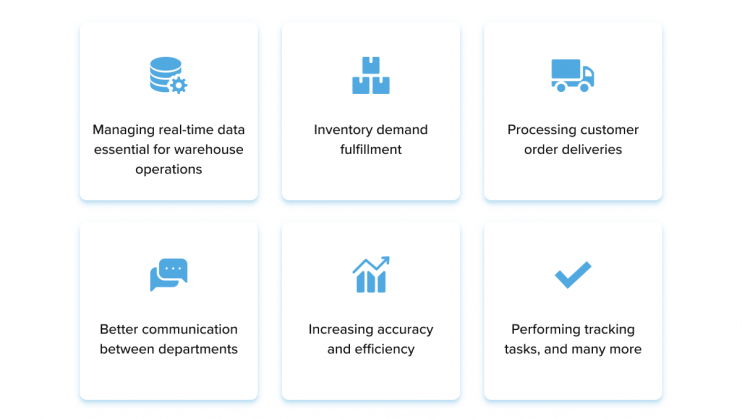With enthusiasm, let’s navigate through the intriguing topic related to From Chaos to Clarity: The Rise of Intelligent Inventory Management. Let’s weave interesting information and offer fresh perspectives to the readers.
From Chaos to Clarity: The Rise of Intelligent Inventory Management

Imagine a world where your warehouse isn’t a labyrinth of misplaced boxes and forgotten stock. Instead, it’s a well-oiled machine, humming with efficiency, where every item finds its rightful place, and orders are fulfilled with lightning speed. This isn’t a futuristic fantasy; it’s the reality that intelligent inventory management systems are making possible.
For businesses of all sizes, managing inventory is a constant balancing act. Too much stock ties up valuable cash flow and risks obsolescence, while too little can lead to lost sales and frustrated customers. In the past, managing inventory meant relying on spreadsheets, manual counting, and a lot of guesswork. But the rise of technology has ushered in a new era, one where data drives decisions and artificial intelligence helps optimize every step of the supply chain.
The Evolution of Inventory Management: From Manual to Automated
The journey of inventory management has been one of gradual evolution, driven by the need for greater accuracy, efficiency, and visibility.
- The Early Days: Manual Tracking and Guesswork
In the early days, businesses relied heavily on manual inventory tracking. This involved keeping detailed records on paper, physically counting stock, and relying on intuition to make ordering decisions. This method was time-consuming, prone to errors, and lacked the real-time insights needed to make informed choices.
- The Rise of Software: Streamlining Operations
From Chaos to Clarity: The Rise of Intelligent Inventory Management

The introduction of inventory management software marked a significant shift. These systems automated many tasks, such as order processing, stock tracking, and reporting. They provided a centralized platform for managing inventory data, offering a more efficient and accurate approach.
- The Power of Cloud Computing: Accessing Data Anywhere, Anytime
Cloud-based inventory management solutions further revolutionized the industry. With cloud computing, businesses could access their inventory data from anywhere, at any time, using any device. This enabled real-time visibility into stock levels, order status, and other key metrics, fostering greater collaboration and agility.
- The Age of AI: Predictive Analytics and Automated Optimization
Today, we’re entering the era of intelligent inventory management, powered by artificial intelligence (AI). AI algorithms analyze vast amounts of data to identify patterns, predict future demand, and optimize inventory levels. These systems can automatically adjust order quantities, reorder points, and even forecast potential stockouts, minimizing disruptions and maximizing efficiency.
The Benefits of Intelligent Inventory Management: Unlocking Efficiency and Growth
The benefits of implementing intelligent inventory management systems are undeniable. They empower businesses to:
-
Today, we’re entering the era of intelligent inventory management, powered by artificial intelligence (AI). AI algorithms analyze vast amounts of data to identify patterns, predict future demand, and optimize inventory levels. These systems can automatically adjust order quantities, reorder points, and even forecast potential stockouts, minimizing disruptions and maximizing efficiency.
Reduce Costs: By optimizing inventory levels, minimizing waste, and streamlining operations, businesses can significantly reduce costs associated with storage, transportation, and obsolescence.
-
Improve Customer Satisfaction: Meeting customer demand consistently with fast and accurate order fulfillment leads to increased satisfaction and loyalty.
-
Boost Sales: By preventing stockouts and ensuring products are always available, businesses can capitalize on sales opportunities and increase revenue.
-
Gain Competitive Advantage: Intelligent inventory management systems provide businesses with a competitive edge by enabling them to respond to market fluctuations quickly and efficiently.
-
Enhance Decision-Making: Real-time data and predictive analytics empower businesses to make informed decisions based on accurate insights, leading to better planning and forecasting.
Thus, we hope this article has provided valuable insights into From Chaos to Clarity: The Rise of Intelligent Inventory Management.
Beyond the Basics: Advanced Features of Intelligent Inventory Management Systems
Modern inventory management systems offer a wide range of advanced features that go beyond basic tracking and reporting. These include:
-
Demand Forecasting: AI-powered algorithms analyze historical data and external factors to predict future demand, enabling businesses to proactively adjust inventory levels and avoid stockouts.
-
Automated Reordering: Systems can automatically trigger reorders based on predefined thresholds, ensuring that stock levels are replenished before they run out.
-
Warehouse Management: Intelligent inventory management systems can integrate with warehouse management systems (WMS), providing real-time visibility into stock locations, movement, and picking processes.
-
Supply Chain Optimization: By analyzing data across the entire supply chain, businesses can identify bottlenecks, optimize routes, and improve overall efficiency.
-
Inventory Analytics: Advanced reporting and analytics tools provide businesses with insights into inventory performance, helping them identify areas for improvement and optimize their strategies.
Case Studies: Real-World Examples of Intelligent Inventory Management Success
The impact of intelligent inventory management is evident in real-world case studies.
-
Amazon: The e-commerce giant leverages AI-powered algorithms to predict demand, optimize inventory levels, and manage its vast network of warehouses. This enables them to fulfill orders with lightning speed, providing customers with a seamless shopping experience.
-
Walmart: The retail giant uses sophisticated inventory management systems to track stock levels across its vast network of stores. This allows them to optimize inventory levels, minimize waste, and ensure that products are always available to customers.
-
Nike: The sportswear giant uses intelligent inventory management systems to track the movement of raw materials, finished goods, and products in transit. This enables them to optimize production processes, reduce lead times, and respond quickly to changes in demand.
The Future of Inventory Management: Emerging Trends and Innovations
The future of inventory management is bright, with emerging trends and innovations poised to further revolutionize the industry.
-
Internet of Things (IoT): Connecting inventory items with sensors and RFID tags allows for real-time tracking of stock levels, movement, and condition. This data can be used to optimize inventory management and reduce waste.
-
Blockchain Technology: Blockchain can enhance supply chain transparency and traceability, enabling businesses to track the origin and movement of goods with greater accuracy and security.
-
Artificial Intelligence (AI): AI will continue to play a crucial role in inventory management, with advancements in machine learning and deep learning leading to more sophisticated demand forecasting, automated optimization, and predictive analytics.
-
Cloud Computing: Cloud-based inventory management solutions will continue to gain popularity, offering businesses scalability, flexibility, and cost-effectiveness.
Conclusion: Embracing Intelligent Inventory Management for Success
In today’s competitive business landscape, efficient inventory management is no longer a luxury but a necessity. Intelligent inventory management systems empower businesses to optimize their operations, reduce costs, improve customer satisfaction, and gain a competitive edge. By embracing these technologies and leveraging the power of data and AI, businesses can transform their warehouses into engines of efficiency and drive growth in a rapidly evolving marketplace.
We thank you for taking the time to read this article. See you in our next article!
